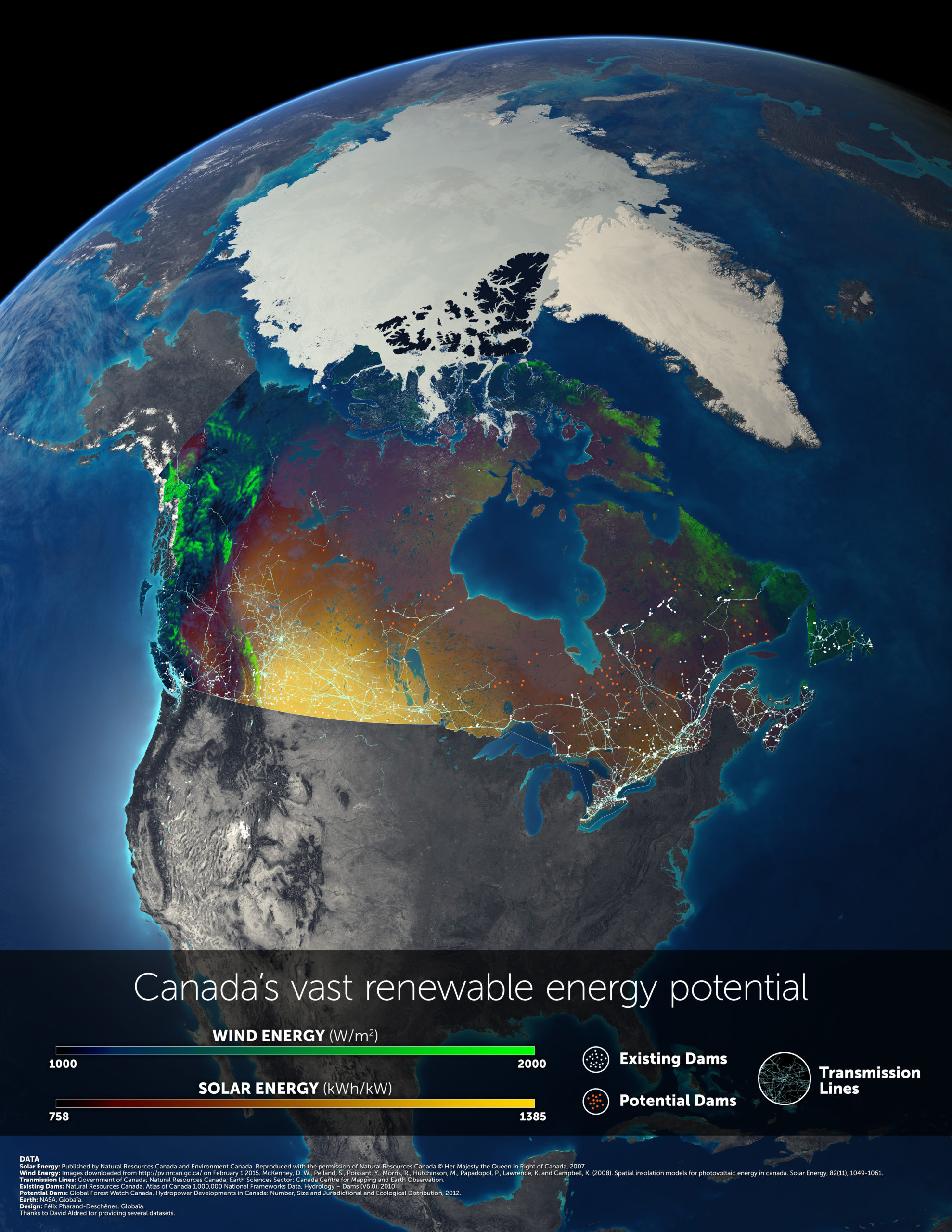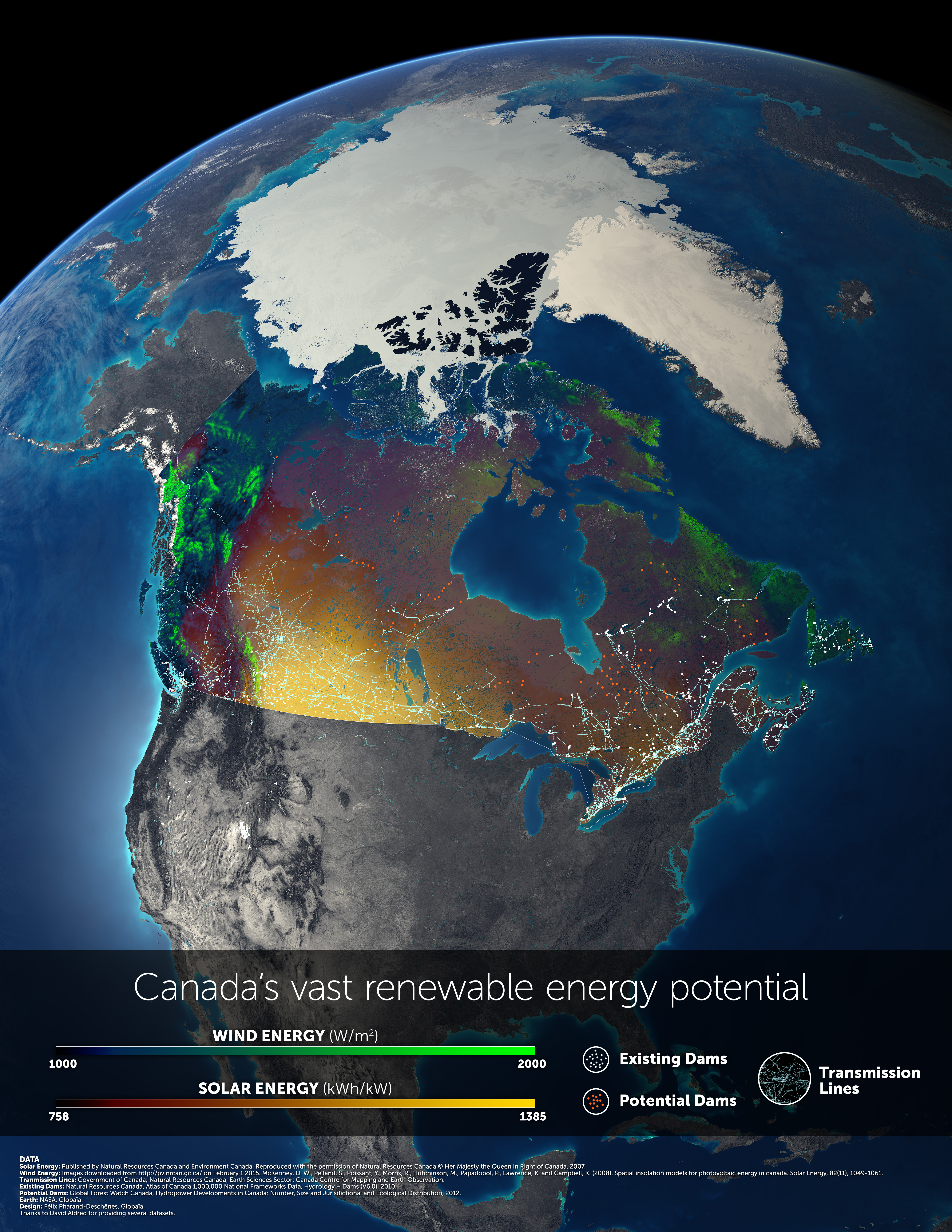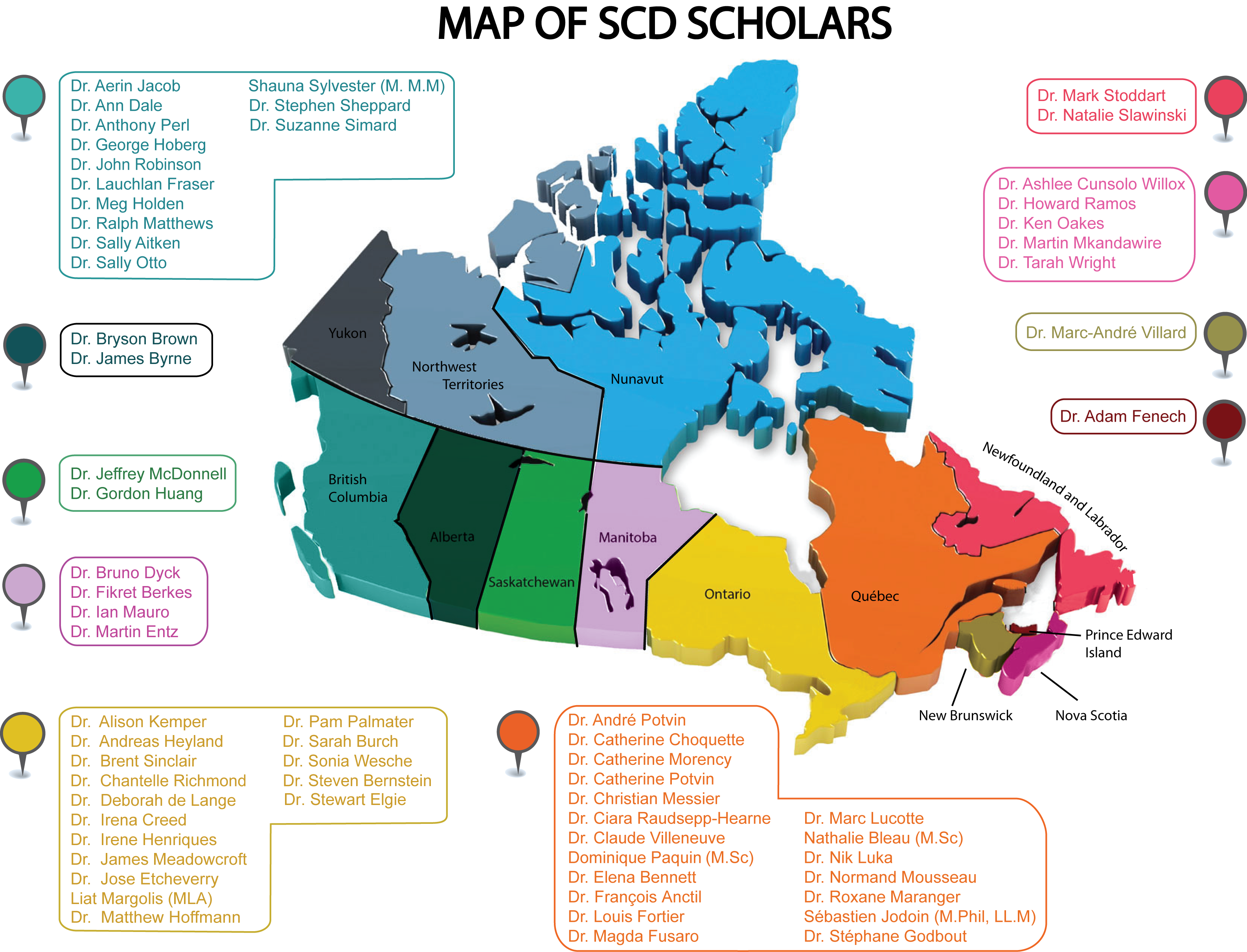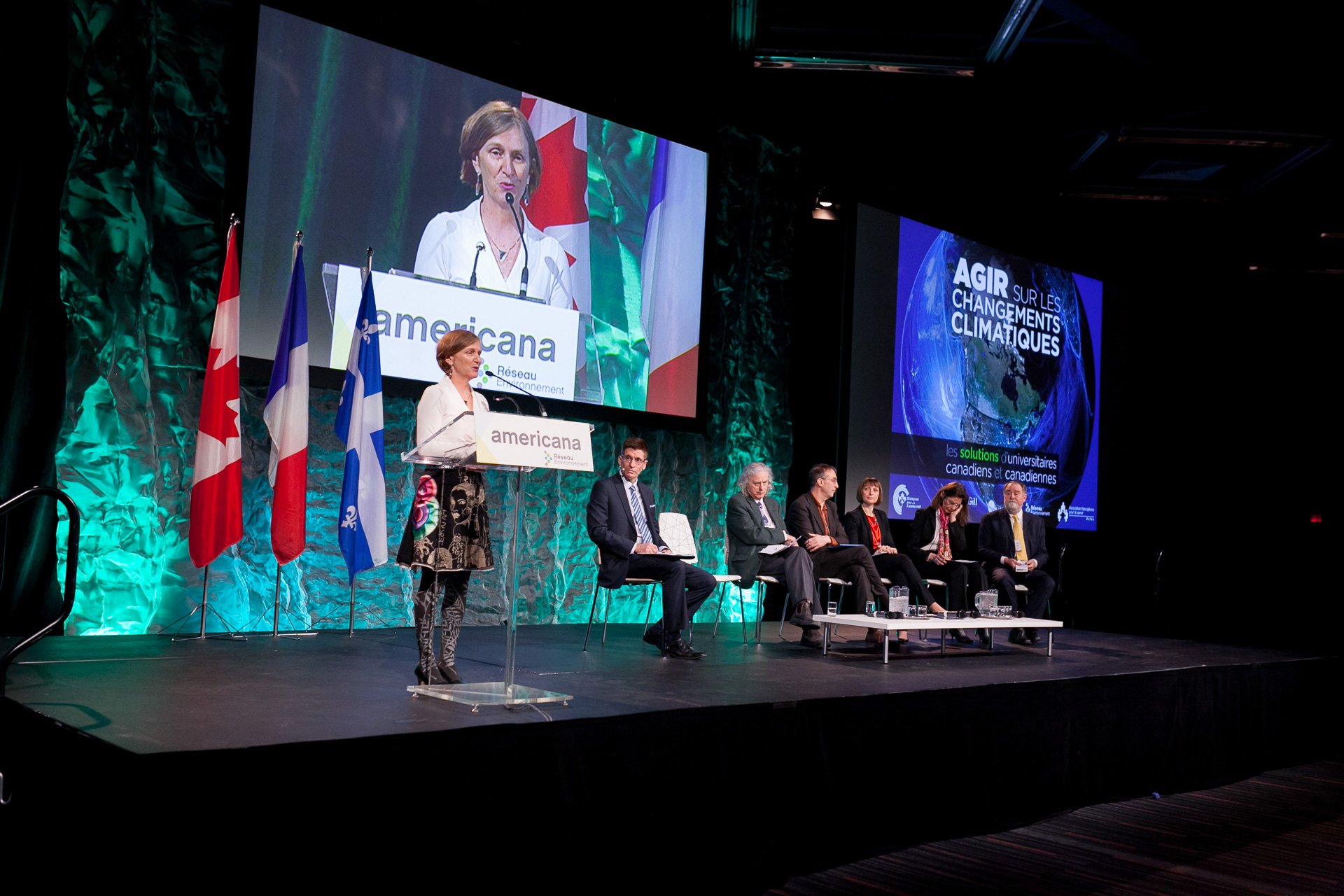Sustainable Canada Dialogues

Projects Sponsor
Summary
Sustainable Canada Dialogues, a collaboration among more than 60+ researchers from 10 provinces representing climate change expertise across a wide range of disciplines, from engineering to sociology, biology to business, resulted in the scholarly consensus “Acting on Climate Change: Solutions from Canadian Scholars”. This made-in-Canada Climate Action Plan rests on the opinion that Canada must immediately begin its transition toward reducing our greenhouse gas emissions by 80% by 2050. While putting a national price on carbon is crucial, we propose that the backbone of a successful transition is to achieve 100% low-carbon electricity by 2035. Sustainable Canada Dialogues proposed 10 policy orientations that can kick-start Canada’s transition to a low-carbon economy starting now.
Sustainable Canada Dialogues brought some of the best minds in Canadian universities out of the academy and into the public sphere to propose made-in-Canada solutions for greenhouse gas (GHG) emission reduction. Our objective is to communicate with the people of Canada about science-based evidence for climate change mitigation in order to stimulate policy action.
This collaboration among more than 60+ researchers from 10 provinces representing climate change expertise across a wide range of disciplines, from engineering to sociology, biology to business, resulted in the scholarly consensus Acting on Climate Change: Solutions from Canadian Scholars. We understand GHG reduction as a medium- to long-term “transition” to a low-carbon society where some economic sectors will contract as others expand. This transition will also usher in great opportunities for developing new technologies, businesses and employment.
To date Canada has failed to meet its international commitments to address climate change. As scholars, we share the concern that if governments in Canada do not steer the course of economic and social development toward sustainability, the next generation of citizens will face dire consequences. We were sparked into action because 2015 is a key year for climate change action, with the international climate conference (Paris 2015) directly on the heels of a federal election.
We collectively agree that Canada must immediately begin its transition toward reducing our GHG emissions by 80% for 2050. While putting a national price on carbon is crucial, we propose that the backbone of a successful transition is to achieve 100% low-carbon electricity by 2035.
Sustainable Canada Dialogues proposed 10 policy orientations that, amongst others, include:
- Encourage interprovincial smart grid electricity connections to take full advantage of the vast renewable energy potential of Canada;
- Eliminate direct and indirect subsidies to the fossil fuel industry;
- Integrate sustainability and climate change into landscape planning, notably through increasing urban density as a solution to sprawl and dependency on single-passenger commutes;
- Ensure that new infrastructure investments are consistent with de-carbonizing Canada;
- Substitute fossil fuel with electricity in transport, especially for urban transport;
- Implement energy efficiency programs in buildings, businesses and industries.
Looking at climate policy in another way
Sustainable Canada Dialogues is highly innovative in many ways:
(1) Consensus: It developed, for the first time in Canadian history, a broad-based consensus around comprehensive solutions to climate change amongst scholars from coast to coast. Reaching consensus among climate scholars from different provinces, areas of expertise, age, language and gender was a lofty goal, and one not previously accomplished in Canada. Acting on Climate Change: Solutions from Canadian Scholars thus crystalizes the knowledge of scholars who have been working for decades on climate change and who hold at heart the future we will leave to the next generation.
(2) Actionable Now: Studies show that people feel overwhelmed by the very concept of climate change, and for good reason: it can be terrifying to hear about a visibly melting Arctic and hurricanes, droughts and floods! In response to this feeling of helplessness, Acting on Climate Change: Solutions from Canadian Scholars proposed practical solutions. We answered the question: “What can we do, starting today, at all levels of government and across all sectors, regardless of political affiliation?” This aspect of the dialogue resonated especially well with Canadians, as shown by numerous emails thanking us for putting hope at the heart of our analysis and proposals.
(3) Positive and inclusive: Reducing GHG emissions throughout Canada requires a collective transition toward a new model of development that improves human well-being and environmental quality, while creating a new vision for Canada’s economic future and opening important opportunities for innovation and employment. We believe that all sectors of Canada must engage in this transition. Sustainable Canada Dialogues does not put blame on anyone, but rather seeks solutions viable in all provinces and territories. This was highlighted in an editorial on our position paper entitled “A Marshall Plan for Canada”!
(4) Reaching out to Canadians: Outreach has been a central objective of Sustainable Canada Dialogues from the beginning. Scholars who joined the initiative participated in public events, from submitting op-eds to newspapers to hosting workshops, speaking with the media or meeting with policy-makers and community members – quite a success for professors more accustomed to classrooms than to journalists and politicians!
Sustainable Canada Dialogues’ outreach campaign began with the March 2015 release of our consensus paper, Acting on Climate Change: Solutions from Canadian Scholars, at Americana 2015, the International Trade Show on Environmental Technologies in Montreal. Our initiative has been referenced in 84 print and online articles (130 including reprints); 44 radio interviews were given by our scholars; three television segments were dedicated to Sustainable Canada Dialogues; our scholars gave 20 conferences over two months; and we have directly met with over 50 policy-makers, including two Provincial Ministers, two Provincial Deputy Ministers and 15 Members of Parliament.
The nuts and bolts
The project was developed under the leadership of Catherine Potvin (McGill University) with the help of a scientific committee (Sally Aitkens, University of British Columbia; Fikret Berkes, University of Manitoba; Liat Margolis, University of Toronto; Mark Stoddart, Memorial University); an outreach committee (Aerin Jacobs, University of Victoria; Natalie Slawinsky and Mark Stoddart, Memorial University; Howard Ramos and Tarah Wright, Dalhousie University; Taysha Palmer, knowledge consultant); and project assistant Natalie Richards, McGill University.
We used a Delphi survey, applied with the help of Rosine Faucher, McGill University, supported by Tarah Wright and John Robinson, University of British Colombia, to produce a consensus on the main areas for action: transition to a low-carbon economy; transforming the energy system; urban planning and transportation; governance and institutions; land use; education, information and research. Thirty scholars then joined in to form six knowledge-based groups (led by Debbie de Lange, Ryerson University; Meg Holden, Simon Fraser University; George Hoberg, University of British Columbia; Normand Mousseau, Université de Montréal; Sally Aitkens and Mark Stoddart) to write initial drafts for each section. Once the sections were integrated into one paper, it was sent for review and feedback to the 30 Sustainable Canada Dialogues scholars who were not part of the drafting groups and to 10 independent experts from across the country. A final drafting team (Catherine Potvin; Normand Mousseau; George Hoberg; James Meadowcroft, Carleton University) integrated the comments. The final version was approved by all 60+ Sustainable Canada Dialogues scholars following three rounds of review.
Obstacles faced
Notwithstanding its success, Sustainable Canada Dialogues has faced three main obstacles.
First, it was challenging to find scholars from Alberta and Saskatchewan to join the initiative. While almost every scholar we approached in the rest of Canada immediately accepted our invitation, it was not easy to get buy-in from scholars in these two provinces. In the end, those colleagues from Alberta and Saskatchewan who joined have been amazingly helpful.
Second, financing has also been a challenge. As the project progressed, it became increasingly ambitious in its scope, and this came with ever-rising costs. We are immensely grateful to the Trottier Institute for Science and Public Policy and the Faculty of Science of McGill University for being so supportive and for helping us until the end, despite “inflation”.
The third challenge was communication. We strived to use a language that would engage people. We also wanted an iconic image to convey Canada’s enormous renewable energy potential. Two partners helped us in reaching these goals: Taysha Palmer, who tirelessly read, re-read and re-re-read our paper, and Felix Pharand-Deschênes and the incredible team of Globaïa for the visuals. However, the communication challenges were not over after writing the position paper. Even our outreach committee admitted to having no “on-the-ground” experience with the media. Furthermore the communication specialists that we sought to contract either had contacts in Québec or in English Canada. No one seemed able to reach the entire country. So, we re-invented a way of communicating science garnering Canada-wide coverage by pooling the resources of all the scholars. We salute James Byrne, University of Lethbridge; George Hoberg, University of British Colombia; Catherine Potvin; and Shauna Sylvester, Simon Fraser University who played a central role in contact with the media. They were supported by Jocelyne Néron and Nadia Seraïocco for Sustainable Canada Dialogues; Dale Duncan, University of Toronto; Carole Graveline and Fabrice Rivault, McGill University.
Sustainable Canada Dialogues believes that putting options on the table is long overdue.
Acknowledging that our proposals are limited by our respective fields of expertise, we circulated our paper for feedback from a spectrum of business associations, non-governmental and youth organizations, labour groups, First Nations institutions, and private citizens. Their responses are consolidated in Acting on Climate Change: Extending the Dialogue Among Canadians, to be released on October 8th 2015. It shows that Canada is brimming with ideas and the will to change. We thus hope to help governments at all levels make ambitious and thoughtful commitments to emission reduction in 2015, a year that will be decisive for global climate policy.
















